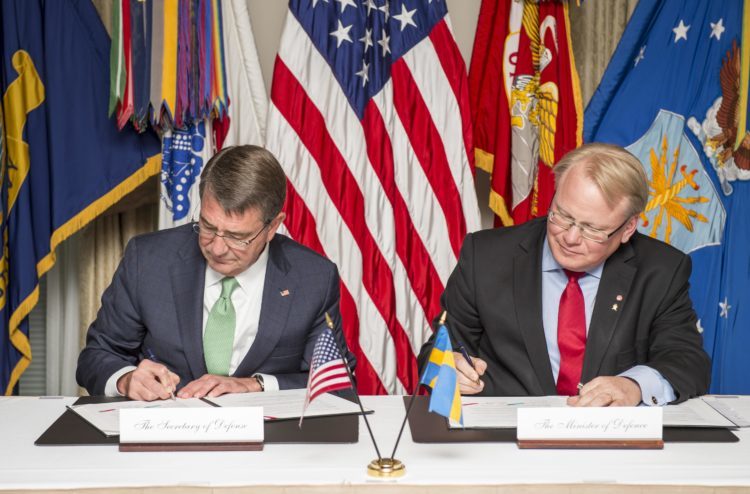
Former Defense Secretary Ash Carter (left) signs a statement of intent between Sweden and the United States along with his Swedish counterpart Peter Hultqvist (right) in June, 2016. Photo: U.S. Department of Defense
The conditions for maintaining a close relationship between Sweden and the United States are favorable under the Trump administration. However, the Swedish government has to prioritize other issues than under the Obama presidency to retain close ties to Washington.
On October 4, the Center for Transatlantic Relations at Johns Hopkins SAIS organized a seminar on the theme “Rethinking U.S.-Nordic Cooperation”, where four prominent Nordic speakers participated in a panel discussion. Despite the numerous seminars taking place daily in Washington, there was a notable interest – especially from employees at the State Department – to get a Nordic perspective on the possibilities for collaboration with the new administration. Perhaps this interest was due to the Nordic countries’ reputation as “problem solvers, not problem creators”, as the former Icelandic diplomat Erlingur Erlingsson put it during the seminar.
Under the Obama administration, the U.S. and the Nordic countries had a visibly close relationship. This closeness was manifested in May, 2016, when the Nordic prime ministers made a joint state visit to Washington. During the visit, the Nordic countries received praise from President Obama, who emphasized that he and the Nordic leaders saw eye to eye with each other on a great deal of issues, including the need for global efforts to combat climate change.
With Donald Trump in the White House, the circumstances have changed. Trump’s policies are insular and protectionist in a way that is not particularly Nordic. Still, underneath the surface, there is a lot that suggests that the relationship between the United States and the Nordic countries remains strong. In the discussion following the panelists’ presentations, representatives from the State Department noted that although the federal government’s priorities have shifted, the routines within the bureaucracy have not done so to the same extent. The agenda might look different, but the U.S. is still open to cooperation with friendly nations, a category which the Nordic countries surely belong to.
From the Swedish perspective, collaborating with the U.S. – the world’s only political, economic, military and cultural superpower – is inevitable. The U.S. is Sweden’s third largest market for exports and the main guarantor of security in Sweden’s neighborhood, i.e. the Baltic Sea region. At the same time, Sweden is the 11th largest source of foreign direct investments in the U.S., and Swedish investments have created more than 330,000 American jobs. Therefore, the question is how the Swedish government can leverage American goodwill to win the ear of the Trump administration?
First and foremost, the Swedish government has to realize that it needs to prioritize new issues to maintain close transatlantic ties. One of the most important issues where Swedish collaboration can benefit American interests is security in the Baltic Sea region, a point which Katarina Tracz from the Stockholm Free World Forum stressed in her opening statement. A country that has understood this new context well and consequently re-emphasized its commitment to defense is Estonia, whose selling point is that it is one of the few NATO countries which allots more than 2 percent of GDP to defense spending. While Sweden is not a NATO member, the Swedish government could certainly benefit from proving itself to be a reliable partner that contributes to keeping U.S. allies safe. A recent survey from The Chicago Council on Global Affairs shows that the support for defense of America’s Baltic NATO allies is strong, even among core Trump supporters: 52 percent of all voters (and 56 percent of Trump voters) are in favor of using U.S. troops to aid Latvia, Lithuania, or Estonia in case of a Russian invasion.
In such a context, the Swedish government’s support for the ineffectual UN Nuclear Weapons Ban Treaty – which can put Sweden’s host nation support agreement with NATO at risk – is problematic. Along with Deputy Prime Minister Isabella Lövin’s poorly veiled mocking of Trump on social media, the dispute over the UN treaty offers another example of how the Swedish government is causing harm to Swedish-American relations. Sweden’s activist stance also contrasts with how its neighboring countries have engaged with the new administration. For instance, the Finnish government has been more strategic and less idealistic in its analysis of the UN Nuclear Weapons Ban Treaty’s consequences. Denmark’s Prime Minister Lars Løkke Rasmussen was among the first European leaders to visit Trump in Washington, and clearly expressed that the U.S. can count on Denmark. By contrast, some of the Swedish government’s actions contribute to an image of a divided West, which benefits actors such as the Putin regime.
Does this mean that the Swedish government should stop discussing topics like climate change with Americans altogether? No, not at all. But at a time when the American administration consists of a number of climate skeptics and businessmen with other priorities, it has become harder to discuss climate issues constructively at the federal level. However, several American cities and states – which are often as populous as European countries – are still committed to the Paris Treaty. For this reason, there are excellent opportunities to have productive conversations about environmental issues with American mayors and governors.
But in the near future, security is the most fruitful area for Swedish cooperation with the U.S. at the federal level. Supporting U.S. efforts to keep the Baltics safe is also in Sweden’s national interest. Even a conflict of limited scope in the region would most likely involve Sweden in some way, and would definitely have negative consequences for Swedish businesses in the Baltic countries. And given the transactional style of the Trump administration, perhaps collaborating on issues important to the U.S. could open the door to joint efforts on other, more traditionally Nordic issues as well.
Emanuel Örtengren is a Visiting Fellow at the Center for Transatlantic Relations at Johns Hopkins SAIS.





